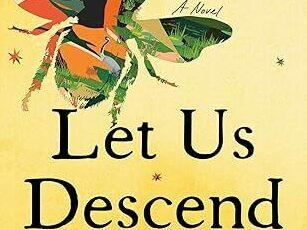Section Branding
Header Content
'Let Us Descend' follows a slave on a painful journey — finding some hope on the way
Primary Content
Jesmyn Ward's Let Us Descend is a superb historical-fiction novel sprinkled with supernatural elements that pulls readers into the life of a slave on a long, painful journey.
And, while accurate, this description fails to communicate the depth of this novel as well as the multiplicity of layers in which it works. Angry, beautiful, raw, visceral, and heartfelt, Let Us Descend is the literary equivalent of an open wound from which poetry pours. This novel is a thing you can't help but to feel, a narrative that hurts to read but that also fills you with hope. Ward's work always demands attention, but this book makes it impossible to look away even in its ugliest, most agonizing moments.
Annis is the daughter of an enslaved woman who was raped by her enslaver. Her life is rough, but once she's separated from her mother and then sold by her own father, things get worse. Annis struggles through endless miles on her way to being sold. Tied to other women and walking next to chained men, Annis' feet bleed as she's forced to walk for entire days without food and cross rivers with her hands tied. From the Carolinas, through fields and swamps, all the way to New Orleans, Annis walks and walks, witnessing brutality daily and fighting to keep her humanity intact.
Through her harrowing journey, Annis turns inward — relying on the memories of her mother and the stories she told her about her warrior grandmother — to find comfort, to find the strength to keep going. That introspection pierces the veil and soon Annis starts communicating with spirits and receives regular visits from Aza, her ancestor, who also used to visit her mother. As she begins her new life at a different place, her understanding of the world and the forces that affect it changes and Annis learns to listen to the spirit world. A narrative that plunges headfirst into the evils of slavery, injustice, and abuse, Let Us Descend also morphs into a story of queer love, rebirth, and the importance of memory.
Let Us Descend is an uncomfortable read. Physical, psychological, and sexual violence were constants for slaves, and Ward doesn't shy away from any of it. In fact, Annis' months-long journey is recounted in exhausting detail. At first, it all feels like too much, like the novel could've been edited to move faster through her journey. But over time Ward's intent is revealed and readers come to understand that the details are there because they were part of the story of thousands of souls, and if they had to get through it, the least we can do is read about it, feel their pain, develop more empathy, and make sure we fight the remnants of that treatment wherever we encounter them. Despite those dreadful details, this is not just a narrative that forces readers to look at this country's ugly past and face the lingering effects of its history; it's also a story about perseverance and the power of the spiritual world.
"The Water is all spirit. Before you and me, before anything, there was the Water. We come from the Water. We return to the Water. Only the Water knows all, but the Water does not speak." Those words from Aza exemplify the beautiful word puzzles the spirit world gives Annis. Ward's lyricism is used to great effect, especially in the novel's last third, and the words of the spirit world take center stage. Let Us Descend, which gets its title from Dante's Inferno (Dante makes a few appearances and is referred to as "the Italian") echoes that work in that it shows its characters' descent into hell. However, unlike Dante's masterpiece, Ward also offers a map to crawl back out.
Let Us Descend is as upsetting as it is beautiful and necessary. Ward's writing about slavery doesn't add anything new to the discussion, but her unique mix of historical fiction, supernatural elements, and gorgeous prose helps her carve out a special place in literature that deals with the subject. It's rare to have a historical novel that also feels timely, but this story pulls it off. Readers will walk with Annis, see the world through her eyes, and feel the pain of everything she experiences — but that journey, that suffering, will give them clarity and help them develop a deeper understanding of love, grief, and the realities of slavery. Ward has taken Black history in a time of racial and political turmoil and used it to scream about grief and injustice, but also about beauty, queer love, history, determination, and joy.
Gabino Iglesias is an author, book reviewer and professor living in Austin, Texas. Find him on X, formerly Twitter, at @Gabino_Iglesias.
Copyright 2023 NPR. To see more, visit https://www.npr.org.

